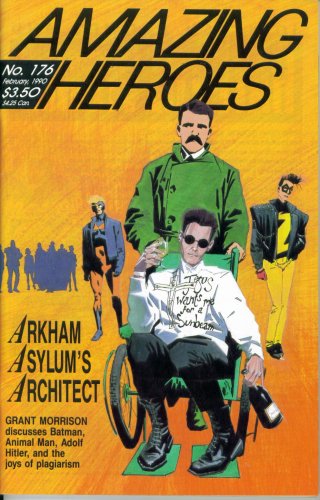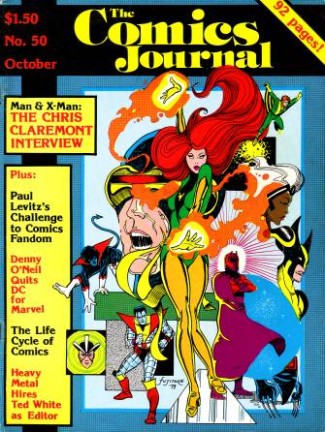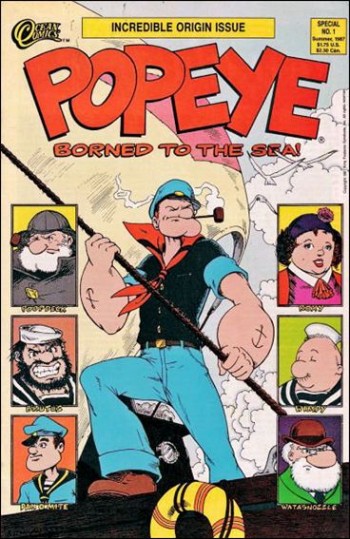
July 31, 2013
 GroupThink Results: Comics Industry Coverage
GroupThink Results: Comics Industry Coverage


Yesterday I asked
CR readers to sound off on their ideas about the future of the coverage of the comics industry, what they'd like to see and why. Accompanying that request was this attempt at a response from me.
I'm usually pretty kind to industry journalism. I think comics is fairly well covered in a lot of ways, particularly relative to writing about other art forms and their businesses. There is at least one thing I admire about all of the major groups and efforts devoted to comics in a journalistic way, and there is a lot that I feel is genuinely laudable about most of the brand-name locations.
That in mind, and with the obvious caveat that I'm in this specific line of business, I'd like to see a few things happen:
* more rational discourse about and coverage of the newspaper strip business. I think that may be one area where were better served 10 years ago with some of the coverage we had then, although that may be a completely unfair generalization.
* more site-sponsored, long-form journalism, particularly from the sites that are sites (TCJ, CBR) and that have some resources to devote someone to generating material on their own rather than in reaction to the news.
* more formal obituaries as opposed to personal reminiscences. I love personal reminiscences, particularly when they have something to say about the person that passed more than the person that's do the reminiscing. Still, I think the first draft of history is in those obits.
* fewer people working for free or for fiendishly reduced rates. I think this has an impact on everything, from the expectations we have for the quality of work that we do to crowding the marketplace in a way that makes it hard for specific folks to get over enough that what little money there is might be used to support their work.
* ownership of articles by article-writers as the industry standard, except perhaps when salaried work is involved or unless a specific deal for a specific run of columns or articles is worked out, for instance a run of news briefs for which there is likely no secondary market.
* a vast reduction in use of the word "exclusive" and of search engine optimization tactics more generally. The term "exclusive" shouldn't be used for gift-wrapped content; that word implies an achievement in securing a story greater than being the recipient of one. I also believe that all news organizations should offer original, unique content on a regular basis. An in-text "exclusive" quote from anyone other than Steve Ditko should probably be skipped.
* more writing to a general audience from our knowledgeable insiders.
* no coverage of any story that could be a story at the Daily Bugle or Daily Planet.
* I wish more writers who wrote for group sites were more careful to build up an identity of their own that the work for other sites fed into. We shouldn't have to cast around when someone quits a group blogging gig for wherever they landed; we should have a primary destination to find that out that's with us because the column had been sending us there all along.
* greater up-front participation in news stories by the major industry players and a generally more respectful attitude towards those that risk participating. At the very least, I and I'm sure others could take a pass on most of the angry e-mails from folks hoping to direct coverage by strongly asserting you should have known to better present their point of view by some sort of magic osmosis. If you object to something but aren't willing to go on the record, barring some pretty extraordinary circumstances it's difficult to take your objections as seriously as you likely hope we will.
* a better understanding of what "off the record" means. It's something you work out in advance with someone, not a morning-after pill or something you trumpet as a kind of magic spell while saying whatever. You also can't declare other people's information off the record, even if that information is about you. There's also a difference between off the record, background-only and use for non-attribution.
* a greater attention to comics works. Certain cartoonists putting out certain works should be the backbone of coverage.
* wider attention to the issue of creators-in-need. I love charities, but there is a lot more to so many people needing to ask for money than any charity can or should be expected to handle.
* to please stop using the word "comics journalism" for journalism about comics as opposed to its less weird use as meaning "journalism in the form of comics." That's just odd.
I can do better at all of these things, too.
Here are some of the responses. I really appreciated those that sent stuff in; I probably wasn't thinking really clearly that hosting a discussion of an issue in which I'm a daily participant was going to end up with more writing about
CR in a non-critical way than I intended to be in here, but I know those are sincere expressions and hopefully there's enough of value to offset that. Certainly as many of the points made apply to this site as to any other magazine. If you'd like to join your voice to this discussion, including (especially) slamming this site right to the floor,
.(JavaScript must be enabled to view this email address)
*****
 Michael Grabowski
Michael Grabowski
I would be willing to pay a reasonable subscription fee to support a website to pay for journalists reporting, covering, or investigating substantive news involving comics creators, comics businesses and their owners & practices, the interaction of comics with the wider world of culture, business, legal system, politics, and so on. Not stories about creators migrating across titles or companies, and not stories about character developments. But without some kind of payment model for such a website, I can't imagine any website or person regularly providing that sort of writing for such low pay.
It would also be an interesting component of such a site if some of the comics news coverage could utilize the comics form itself. Some of
TCJs Cartoonist Diaries have tilted in that direction.
One current story that comes to mind is the immediate, short-term, and long-term impact that can be known and reported when a sudden void in a key position in comics occurs, usually from a death. What can we know will happen when a
Jay Kennedy,
Rory Root,
Dylan Williams, or
Kim Thompson is suddenly no longer filling a vital role in their own business or the wider comics art-industry culture? The tragic nature of death, especially an unanticipated one, and the general chumminess between people in the comics industry and people who write about it tends to minimize the occurrence of "what happens next?" questioning in the coverage that follows. Granted, that sort of news should be separated from reporting the death itself, but for instance there was no delay in attempts to report on the impact to business at Apple in the wake of Steve Jobs' death.
*****
Robert Boyd
Thanks for including me in your mailing. I don't have strong opinions about comics journalism. The day to day stuff is not particularly interesting to me.
I guess if I have an ideal writer-about-comics, it's
Bob Levin. I'm not sure whether to call his work journalism or history; it contains elements of both. But I like long-form, personally involved non-fiction articles. You wrote one of the classics: "Witness at the Marvelution." (
I just wrote one -- not about comics -- that I'm kind of proud of.) Comics could use a
Grantland. So I guess if comics journalism could attract a bunch of Susan Orleans to the field and manage to pay them to do their stuff, I'd be an eager reader of the results.
*****
Chris Arrant
I've been putting a significant amount of thought into the broader picture of comics industry journalism, especially now that its shrugged off most of the last vestiges of the print medium with the end of Wizard and the change in format for The Comics Journal now firmly in place.
As I've described to other journalistic colleagues working in other areas, comics industry journalism primarily sits in the nexus of
Entertainment Weekly for comics as an entertainment form, but nuanced to target the core audience of full-time comics fans and not to a more general audience. This, as Tom points, leaves other non-"comic book" comics formats like newspaper strips, political cartoons and even some general audience graphic novels even out in the cold in terms of coverage -- but also in terms of audience these comic industry journalism news outlets have garnered. Sometimes you write for the audience you want, but oftentimes the safer bet to keep the lights on is to right for the audience you have.
With that out of the way, here's some white whales I'd love to see comics journalism incorporate in some shape or manner:
Working on more "evergreen" comic stories to compliment the "breaking news" and time-sensitive coverage of releases coming down the pipeline. Right now the money is in getting the big story out there first, and the way the current system is set up it, by-and-large, doesn't foster the focus on evergreen features that could be featured covering broader industry issues, as well as more in-depth coverage of storylines, creators' careers, etc. For all sites, it's the newest stories on top and then older as you get down: imagine if your local newspaper did that. If a book's not a #1, a new creative team or a game-changing story-arc, it's hard to get traction on getting a story in print -- digitally, that is.
Get inside the industry: right now comics industry journalism straddles the line between its niche fan audience and being a more insider-y focus like
Deadline; with some exception though, it's people on the outside wanting to know what's on the inside. I think there's a market for actual industry insider-type approach to comics as a workplace, talking hiring patterns, what the current market is like for works on the book market for creators, and the real realities of working inside comics. I understand that is a niche of an already niche market, but I think there's a highly underserved audience that would pay for a comics equivalent of
The Wall Street Journal.
More upfront disclosure of conflicts of interest. I've written for comic publishers in the past, both doing actual comics and doing journalism for comic companies like
Marvel. In those times I was careful not to cover those publishers' works, and if I needed to I would include a disclosure about my affiliation with them. But right now there's several staffers at comics industry journalism sites, on both an editorial and freelance writer level, who actively do work for comic publishers and also cover those same companies with nary a disclosure to be found.
Comics coverage for the common man: what do comics fan who aren't Wednesday shoppers do when they want to read about comics? They wade into the deep waters of comics news websites by-and-large devoted to fans that live and breathe comics on a daily basis. It's easy because that audience is already build up over time, changing hands from
Newsarama and the
Pulse in the early days over to
CBR,
ComicsAlliance and others in the present day. The best coverage for the casual comics fan is instead found in more geek-centric blogs like
Boing Boing or one of
Wired's blogs, but there exists room for something in between. The problem is building that audience.
*****
 Chris Cummins
Chris Cummins
You make great points. Here's some of my thoughts on what changes I'd like to see from comics journalism:
- I'm not a huge fan of articles that merely rehash the latest
DC and Marvel press releases without adding any insights from the writer.
- I'd much rather see coverage of a forgotten-but-fun comic like
Ocean's weirdo Popeye Special origin story from 1987 than endless news of the latest company-wide event.
- More pieces about industry veterans in need of help.
This LifeHealthPro piece on Bill Mantlo springs to mind, as it ultimately eclipses the industry to become a rumination on the complexities of family and healthcare.
- Some writers are more about building up their own personality and "brand" than actually doing a decent job covering news stories. This is unacceptable to me.
- A greater amount of articles covering the lives of under-the-radar writers and artists. I'd be happier reading about a
Bob Bolling,
Permalink
Daily Blog Archives
November 2019
October 2019
September 2019
August 2019
July 2019
Full Archives


